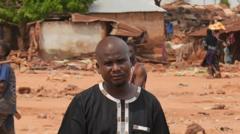In Kano, Nigeria, the hit television show "Gidan Badamasi" influences family planning discussions, reflecting broader societal concerns over high birth rates and their implications for the rapidly growing population in Africa.
A Youthful Debate: TV Dramas Spark Conversations on Family Planning in Nigeria

A Youthful Debate: TV Dramas Spark Conversations on Family Planning in Nigeria
The popular Nigerian show "Gidan Badamasi" ignites discussions about family size amid the continent's population boom.
In a modest home in Kano, Nigeria, five sisters and their brother gather eagerly around a small television, plopping down in a lively heap of laughter and uncompleted school assignments. Like many families in this bustling city, the Sani family anticipates the latest episode of "Gidan Badamasi," a highly popular comedy-drama. The show has captured the community’s imagination, depicting a wealthy, irresponsible protagonist with an astonishing number of wives and children—over 20—often too busy to fulfill his parental responsibilities due to financial stinginess.
The central theme of the series highlights the societal implications of having large families, resonating deeply within Nigeria and across Africa, where the youthful demographic is emerging amidst an unprecedented baby boom. This population growth poses both potential for economic advancement and significant challenges in education and job creation. Many in the region are increasingly aware of these burdens as they witness the juxtaposition of their realities with declining birth rates in wealthier nations.
Statistically, women in Nigeria bear more than five children on average, compared to only about 1.5 for their counterparts in the U.S. and Europe. This stark contrast, coupled with a drop in child mortality rates, has resulted in many children surviving into adulthood. This demographic reality raises urgent conversations regarding resources, education, and economic viability in Nigeria and neighboring countries, reflecting the need to balance family aspirations with the capacities of society at large.
The narrative of "Gidan Badamasi" serves to amplify the discourse around family size decisions, and its cultural impact encapsulates the core issues facing a continent experiencing immense population changes—a theme that continues to be explored as Africa shapes its future.


















